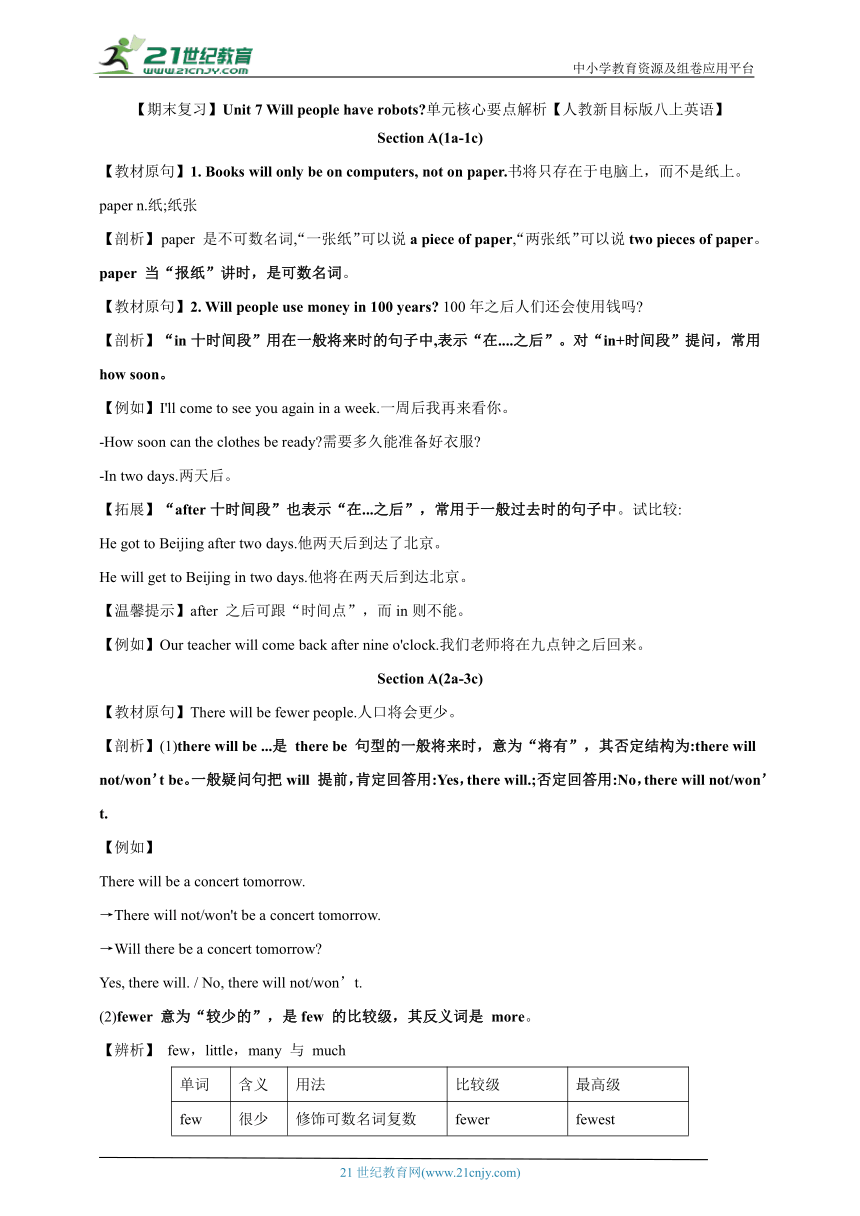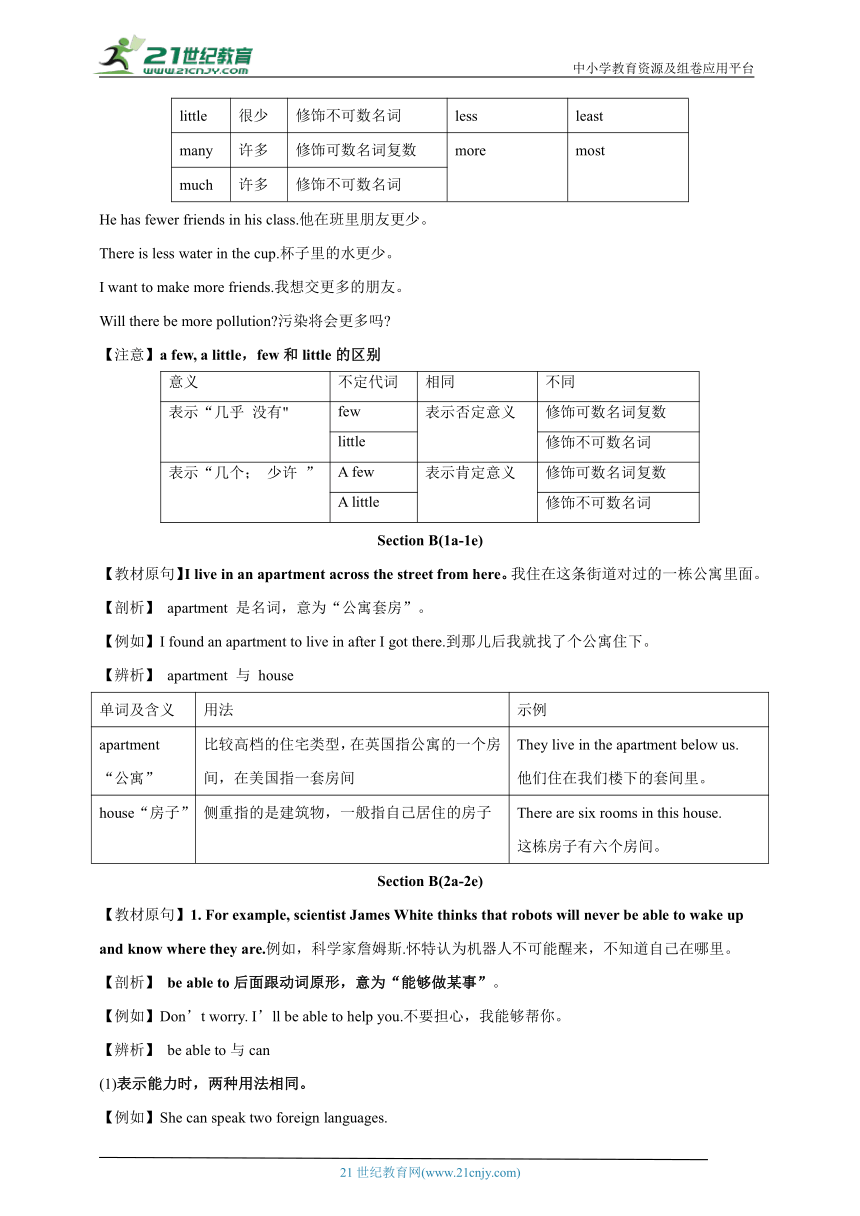【期末复习】Unit 7 Will people have robots?单元核心要点解析(学案)【人教新目标版八上英语】
文档属性
| 名称 | 【期末复习】Unit 7 Will people have robots?单元核心要点解析(学案)【人教新目标版八上英语】 |

|
|
| 格式 | docx | ||
| 文件大小 | 281.3KB | ||
| 资源类型 | 试卷 | ||
| 版本资源 | 人教新目标(Go for it)版 | ||
| 科目 | 英语 | ||
| 更新时间 | 2024-12-19 00:00:00 | ||
图片预览


文档简介
中小学教育资源及组卷应用平台
【期末复习】Unit 7 Will people have robots 单元核心要点解析【人教新目标版八上英语】
Section A(1a-1c)
【教材原句】1. Books will only be on computers, not on paper.书将只存在于电脑上,而不是纸上。
paper n.纸;纸张
【剖析】 paper 是不可数名词,“一张纸”可以说a piece of paper,“两张纸”可以说two pieces of paper。paper 当“报纸”讲时,是可数名词。
【教材原句】2. Will people use money in 100 years 100年之后人们还会使用钱吗
【剖析】“in十时间段”用在一般将来时的句子中,表示“在....之后”。对“in+时间段”提问,常用 how soon。
【例如】I'll come to see you again in a week.一周后我再来看你。
-How soon can the clothes be ready 需要多久能准备好衣服
-In two days.两天后。
【拓展】“after十时间段”也表示“在...之后”,常用于一般过去时的句子中。试比较:
He got to Beijing after two days.他两天后到达了北京。
He will get to Beijing in two days.他将在两天后到达北京。
【温馨提示】after 之后可跟“时间点”,而in则不能。
【例如】Our teacher will come back after nine o'clock.我们老师将在九点钟之后回来。
Section A(2a-3c)
【教材原句】There will be fewer people.人口将会更少。
【剖析】(1)there will be ...是 there be 句型的一般将来时,意为“将有”,其否定结构为:there will not/won’t be。一般疑问句把will 提前,肯定回答用:Yes,there will.;否定回答用:No,there will not/won’t.
【例如】
There will be a concert tomorrow.
→There will not/won't be a concert tomorrow.
→Will there be a concert tomorrow
Yes, there will. / No, there will not/won’t.
(2)fewer 意为“较少的”,是few 的比较级,其反义词是 more。
【辨析】 few,little,many 与 much
单词 含义 用法 比较级 最高级
few 很少 修饰可数名词复数 fewer fewest
little 很少 修饰不可数名词 less least
many 许多 修饰可数名词复数 more most
much 许多 修饰不可数名词
He has fewer friends in his class.他在班里朋友更少。
There is less water in the cup.杯子里的水更少。
I want to make more friends.我想交更多的朋友。
Will there be more pollution 污染将会更多吗
【注意】a few, a little,few和little的区别
意义 不定代词 相同 不同
表示“几乎 没有" few 表示否定意义 修饰可数名词复数
little 修饰不可数名词
表示“几个; 少许 ” A few 表示肯定意义 修饰可数名词复数
A little 修饰不可数名词
Section B(1a-1e)
【教材原句】I live in an apartment across the street from here。我住在这条街道对过的一栋公寓里面。
【剖析】 apartment 是名词,意为“公寓套房”。
【例如】I found an apartment to live in after I got there.到那儿后我就找了个公寓住下。
【辨析】 apartment 与 house
单词及含义 用法 示例
apartment “公寓” 比较高档的住宅类型,在英国指公寓的一个房间,在美国指一套房间 They live in the apartment below us. 他们住在我们楼下的套间里。
house“房子” 侧重指的是建筑物,一般指自己居住的房子 There are six rooms in this house. 这栋房子有六个房间。
Section B(2a-2e)
【教材原句】1. For example, scientist James White thinks that robots will never be able to wake up and know where they are.例如,科学家詹姆斯.怀特认为机器人不可能醒来,不知道自己在哪里。
【剖析】 be able to后面跟动词原形,意为“能够做某事”。
【例如】Don’t worry. I’ll be able to help you.不要担心,我能够帮你。
【辨析】 be able to与can
(1)表示能力时,两种用法相同。
【例如】She can speak two foreign languages.
She is able to speak two foreign languages.
她会讲两种外语。
(2)be able to强调通过努力而获得的某种能力,而can则强调自身已具有的能力。
【例如】I was able to swim well after practicing.经过训练之后我能游得很好了
(3)be able to可以有时态和数的变化,即is/are/was/were/will be able to; 而 can 无数的变化且只有一般现在时和一般过去时两种时态,即can/could.
(4)can可用于否定句或疑问句中表示判断或推测,而be able to 通常不这样用。
【例如】The boy over there can’t be our monitor.The monitor went to the teachers’ office just now那边的那个男孩儿不可能是我们的班长。班长刚才去老师办公室了。
【教材原句】2. Some scientists believe that there will be more robots in the future.一些科学家相信将来会有更多的机器人。
【剖析】 动词 believe 做及物动词时,其后可跟名词,表示“相信”;后接从句时表示“相信,认为”。
【例如】I don’t believe his story.我不相信他的故事。
I believed he told us the truth.我认为他告诉了我们真相。
believe 用法的特别说明:
①后接否定的宾语从句时,通常将否定转移到主句上。
【例如】I don't believe she will like the idea.我认为她不会喜欢这个想法。
②在简略答语中,一般不单独用 believe,而用I believe so. 或I don't believe so./I believe not.来回答。【例如】
-Do you believe he will come 你认为他会来吗
-No, I don't believe so. /I believe not.不,我想不会。
【教材原句】3. However, they agree it may take hundreds of years。然而,他们一致认为这可能花费数百年的时间。
【剖析】(1)however 做副词,意为“然而;不过”,表示转折关系。
【例如】I’d like to go on vacation. However, I’m too busy to leave.我想去度假。然而,我太忙了,脱不开身。
(2)hundreds of 意为“许多;大量”。当hundred,thousand,million 等数词前面有数字修饰,表示具体的数字时,用单数;表示非具体的数字时常用复数,且其后还要加上 of。
【例如】There are more than two hundred horses on his farm.他的农场里有 200 多匹马。
We planted hundreds of trees last year.去年我们种了数百棵树。
【注意】hundred,thousand,million等数词的这种用法巧记为:
模糊数字两有(有s,有of);具体数字两无(无s,无of)
Section B(3a)-Self Check
【教材原句】I want to fly up into the sky.我想飞向天空。
【剖析】(1)fly是动词,意为“飞”,其过去式为flew,其第三人称单数形式为flies。fly up into the sky 意为“飞向天空”, fly to someplace意为“坐飞机去某地”,相当于go to someplace by plane 或 take the plane to someplace。
(2)sky 是名词,意为“天空”。
【例如】What’s that in the sky 天上那是什么东西
语法精讲—一般将来时
考向1 一般将来时的构成
构 成 例 句
主语+will/shall +动词原形+其他 The weather reporter says it will rain tomorrow. 天气预报员说明天将会下雨。
主语+am/is/are going to +动词原形+其他 What are you going to do next week 你下周打算做什么。
【拓展】一般将来时的标志词/短语有:tomorrow,next week,in the future,“in+时间段”,from now on 等。
考向2 一般将来时的用法
(1)表示将要发生的动作,通常和表示将来的时间状语连用。
I will /shall go to visit him next week.下周我将去拜访他。
(2)“be going to+动词原形”表示打算、计划最近或将来要做某事,或有某种迹象表明要发生某事。
We are going to have a meeting today.今天我们要开会。
(3)表示将来的意愿、决心、许诺、命令等时常用will;征求对方意见,主语是第一人称时,用shall。
Shall I open the door 我可以开门吗
(4)come,leave,go,start,move等瞬时性动词,可用现在进行时表将来,指打算或计划做某事。
The singer is leaving for Japan tomorrow. 这位歌手明天将动身去日本。
【拓展】 There be 句型的一般将来时结构为“There will be…”或者“There is/are going to be …”。
There will be new subways soon.很快将会有新地铁。
There is going to be a concert in our neighborhood.在我们社区将会有一场音乐会。
21世纪教育网 www.21cnjy.com 精品试卷·第 2 页 (共 2 页)
21世纪教育网(www.21cnjy.com)
【期末复习】Unit 7 Will people have robots 单元核心要点解析【人教新目标版八上英语】
Section A(1a-1c)
【教材原句】1. Books will only be on computers, not on paper.书将只存在于电脑上,而不是纸上。
paper n.纸;纸张
【剖析】 paper 是不可数名词,“一张纸”可以说a piece of paper,“两张纸”可以说two pieces of paper。paper 当“报纸”讲时,是可数名词。
【教材原句】2. Will people use money in 100 years 100年之后人们还会使用钱吗
【剖析】“in十时间段”用在一般将来时的句子中,表示“在....之后”。对“in+时间段”提问,常用 how soon。
【例如】I'll come to see you again in a week.一周后我再来看你。
-How soon can the clothes be ready 需要多久能准备好衣服
-In two days.两天后。
【拓展】“after十时间段”也表示“在...之后”,常用于一般过去时的句子中。试比较:
He got to Beijing after two days.他两天后到达了北京。
He will get to Beijing in two days.他将在两天后到达北京。
【温馨提示】after 之后可跟“时间点”,而in则不能。
【例如】Our teacher will come back after nine o'clock.我们老师将在九点钟之后回来。
Section A(2a-3c)
【教材原句】There will be fewer people.人口将会更少。
【剖析】(1)there will be ...是 there be 句型的一般将来时,意为“将有”,其否定结构为:there will not/won’t be。一般疑问句把will 提前,肯定回答用:Yes,there will.;否定回答用:No,there will not/won’t.
【例如】
There will be a concert tomorrow.
→There will not/won't be a concert tomorrow.
→Will there be a concert tomorrow
Yes, there will. / No, there will not/won’t.
(2)fewer 意为“较少的”,是few 的比较级,其反义词是 more。
【辨析】 few,little,many 与 much
单词 含义 用法 比较级 最高级
few 很少 修饰可数名词复数 fewer fewest
little 很少 修饰不可数名词 less least
many 许多 修饰可数名词复数 more most
much 许多 修饰不可数名词
He has fewer friends in his class.他在班里朋友更少。
There is less water in the cup.杯子里的水更少。
I want to make more friends.我想交更多的朋友。
Will there be more pollution 污染将会更多吗
【注意】a few, a little,few和little的区别
意义 不定代词 相同 不同
表示“几乎 没有" few 表示否定意义 修饰可数名词复数
little 修饰不可数名词
表示“几个; 少许 ” A few 表示肯定意义 修饰可数名词复数
A little 修饰不可数名词
Section B(1a-1e)
【教材原句】I live in an apartment across the street from here。我住在这条街道对过的一栋公寓里面。
【剖析】 apartment 是名词,意为“公寓套房”。
【例如】I found an apartment to live in after I got there.到那儿后我就找了个公寓住下。
【辨析】 apartment 与 house
单词及含义 用法 示例
apartment “公寓” 比较高档的住宅类型,在英国指公寓的一个房间,在美国指一套房间 They live in the apartment below us. 他们住在我们楼下的套间里。
house“房子” 侧重指的是建筑物,一般指自己居住的房子 There are six rooms in this house. 这栋房子有六个房间。
Section B(2a-2e)
【教材原句】1. For example, scientist James White thinks that robots will never be able to wake up and know where they are.例如,科学家詹姆斯.怀特认为机器人不可能醒来,不知道自己在哪里。
【剖析】 be able to后面跟动词原形,意为“能够做某事”。
【例如】Don’t worry. I’ll be able to help you.不要担心,我能够帮你。
【辨析】 be able to与can
(1)表示能力时,两种用法相同。
【例如】She can speak two foreign languages.
She is able to speak two foreign languages.
她会讲两种外语。
(2)be able to强调通过努力而获得的某种能力,而can则强调自身已具有的能力。
【例如】I was able to swim well after practicing.经过训练之后我能游得很好了
(3)be able to可以有时态和数的变化,即is/are/was/were/will be able to; 而 can 无数的变化且只有一般现在时和一般过去时两种时态,即can/could.
(4)can可用于否定句或疑问句中表示判断或推测,而be able to 通常不这样用。
【例如】The boy over there can’t be our monitor.The monitor went to the teachers’ office just now那边的那个男孩儿不可能是我们的班长。班长刚才去老师办公室了。
【教材原句】2. Some scientists believe that there will be more robots in the future.一些科学家相信将来会有更多的机器人。
【剖析】 动词 believe 做及物动词时,其后可跟名词,表示“相信”;后接从句时表示“相信,认为”。
【例如】I don’t believe his story.我不相信他的故事。
I believed he told us the truth.我认为他告诉了我们真相。
believe 用法的特别说明:
①后接否定的宾语从句时,通常将否定转移到主句上。
【例如】I don't believe she will like the idea.我认为她不会喜欢这个想法。
②在简略答语中,一般不单独用 believe,而用I believe so. 或I don't believe so./I believe not.来回答。【例如】
-Do you believe he will come 你认为他会来吗
-No, I don't believe so. /I believe not.不,我想不会。
【教材原句】3. However, they agree it may take hundreds of years。然而,他们一致认为这可能花费数百年的时间。
【剖析】(1)however 做副词,意为“然而;不过”,表示转折关系。
【例如】I’d like to go on vacation. However, I’m too busy to leave.我想去度假。然而,我太忙了,脱不开身。
(2)hundreds of 意为“许多;大量”。当hundred,thousand,million 等数词前面有数字修饰,表示具体的数字时,用单数;表示非具体的数字时常用复数,且其后还要加上 of。
【例如】There are more than two hundred horses on his farm.他的农场里有 200 多匹马。
We planted hundreds of trees last year.去年我们种了数百棵树。
【注意】hundred,thousand,million等数词的这种用法巧记为:
模糊数字两有(有s,有of);具体数字两无(无s,无of)
Section B(3a)-Self Check
【教材原句】I want to fly up into the sky.我想飞向天空。
【剖析】(1)fly是动词,意为“飞”,其过去式为flew,其第三人称单数形式为flies。fly up into the sky 意为“飞向天空”, fly to someplace意为“坐飞机去某地”,相当于go to someplace by plane 或 take the plane to someplace。
(2)sky 是名词,意为“天空”。
【例如】What’s that in the sky 天上那是什么东西
语法精讲—一般将来时
考向1 一般将来时的构成
构 成 例 句
主语+will/shall +动词原形+其他 The weather reporter says it will rain tomorrow. 天气预报员说明天将会下雨。
主语+am/is/are going to +动词原形+其他 What are you going to do next week 你下周打算做什么。
【拓展】一般将来时的标志词/短语有:tomorrow,next week,in the future,“in+时间段”,from now on 等。
考向2 一般将来时的用法
(1)表示将要发生的动作,通常和表示将来的时间状语连用。
I will /shall go to visit him next week.下周我将去拜访他。
(2)“be going to+动词原形”表示打算、计划最近或将来要做某事,或有某种迹象表明要发生某事。
We are going to have a meeting today.今天我们要开会。
(3)表示将来的意愿、决心、许诺、命令等时常用will;征求对方意见,主语是第一人称时,用shall。
Shall I open the door 我可以开门吗
(4)come,leave,go,start,move等瞬时性动词,可用现在进行时表将来,指打算或计划做某事。
The singer is leaving for Japan tomorrow. 这位歌手明天将动身去日本。
【拓展】 There be 句型的一般将来时结构为“There will be…”或者“There is/are going to be …”。
There will be new subways soon.很快将会有新地铁。
There is going to be a concert in our neighborhood.在我们社区将会有一场音乐会。
21世纪教育网 www.21cnjy.com 精品试卷·第 2 页 (共 2 页)
21世纪教育网(www.21cnjy.com)
同课章节目录
